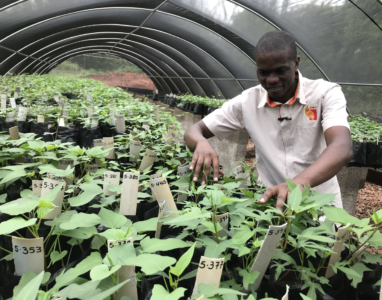 SweetGAINS (Genetic Advances and Innovative Seed Systems) seeks to accelerate and expand the development and dissemination of nutrient-rich, climate-resilient sweetpotato varieties to benefit millions more African families. Launched in December 2019, the project brings together scientists from various disciplines who employ cutting-edge science and methods to modernize national sweetpotato breeding programs in Africa.
SweetGAINS (Genetic Advances and Innovative Seed Systems) seeks to accelerate and expand the development and dissemination of nutrient-rich, climate-resilient sweetpotato varieties to benefit millions more African families. Launched in December 2019, the project brings together scientists from various disciplines who employ cutting-edge science and methods to modernize national sweetpotato breeding programs in Africa.
The current disruption with COVID-19 has not deterred the SweetGAINS team as they are moving ahead with the project where feasible. One such area is the genomic selection work, led by Craig Yencho from North Carolina State University (NCSU). His research aims to deploy proof-of-concept, marker-assisted breeding and genomic-selection tools in Uganda’s National Crops Resources Research Institute (NaCRRI) and within the International Potato Center’s (CIP) programs in Uganda to enhance breeding efficiency. His team will roll these tools out gradually to other breeding programs where the technology and resources are available for proper implementation.
Now in the first year of implementation, Yencho and his team have established a comprehensive work plan for these research objectives to be achieved over the course of the three-year project. With team members in Peru, the US, and spread throughout Africa, the group holds monthly virtual meetings, which are essential for propelling research forward.
The most recent meeting in early April featured 40 scientists with 12 giving formal presentations on a range of topics, including, among others, the development and annotation of reference genomes; discussions of sweetpotato weevils and sweetpotato virus disease; and SweetPotatoBase updates.
The team reported significant disruptions in field and lab activities due to COVID, particularly in delayed genotyping and phenotyping trials. Despite these delays, bioinformatics and analytics are moving forward. The database team, led by Dr. Lukas Mueller at Boyce Thompson Institute (BTI), is also moving forward with the SweetPotatoBase breeding platform, which serves as a breeder’s toolbox for the capture, analysis, and storage of data for all breeding programs.
“Although the in-person event was cancelled, the virtual meetings proved fruitful and allowed the scientists to enhance collaborations and engage in important conversations. The team has learned even more how to navigate digital communication when face-to-face interactions are not possible,” says Yencho. From the meeting, the team decided to have a follow-up discussion on the operational aspects that will be required to implement genomic selection in sweetpotato. That information is forthcoming shortly.
The main takeaway this year has been that regular communication is key. While the team awaits the resumption of stalled lab and field activities, the team members are confident in their ability to continue to move forward and achieve their research objectives as scheduled.
Apart from NCSU, which is represented by Yencho, the genomic selection team includes NaCRRI, led by Bernard Yada; the Boyce Thompson Institute, led by Zhangjun Fei and Lukas Mueller; Michigan State University, led by Robin Buell; the University of Tennessee Institute of Agriculture, led by Bode Olukolu; and the International Potato Center, led by Dorcus Gemenet, who recently joined the CGIAR Excellence in Breeding Platform.
“We offer best wishes to all our colleagues during this pandemic,” said Yencho. “Please stay safe, take care of yourselves, and do all you can to protect yourselves, your families and your friends during these troubling times.”
More information about the SweetGAINS genomic selection work can be found on this post on the NCSU College of Agriculture and Life Sciences website.
Dr Craig Yencho and Emily Milks from North Carolina State University’s (NCSU)
